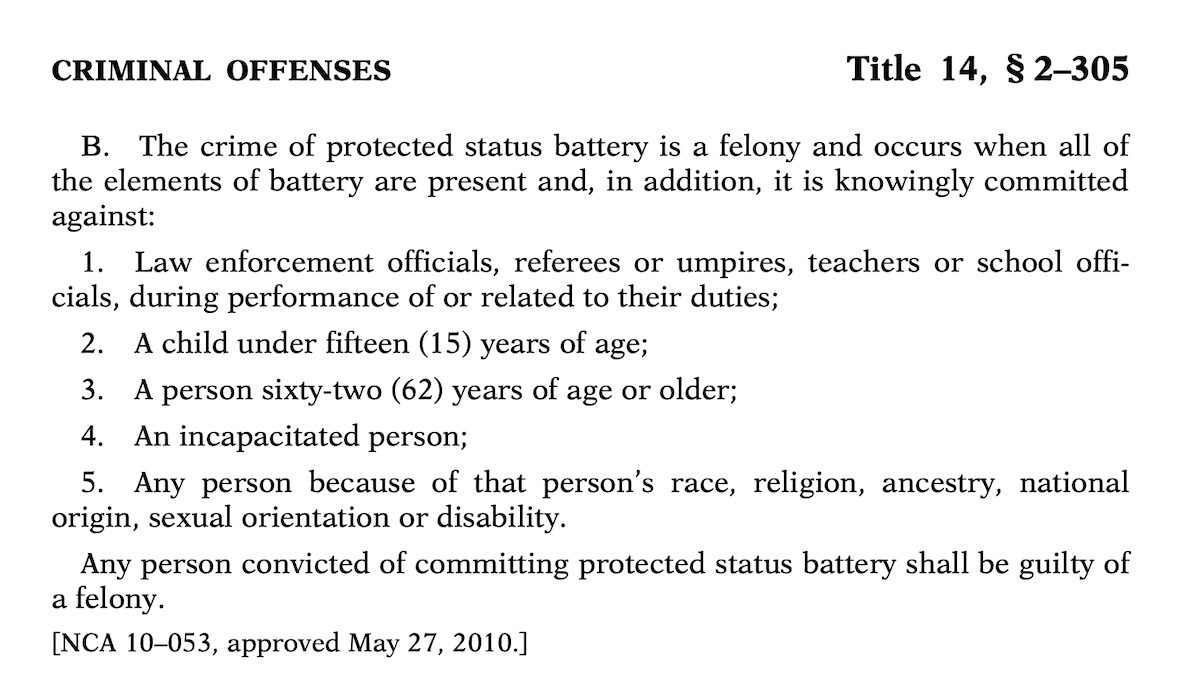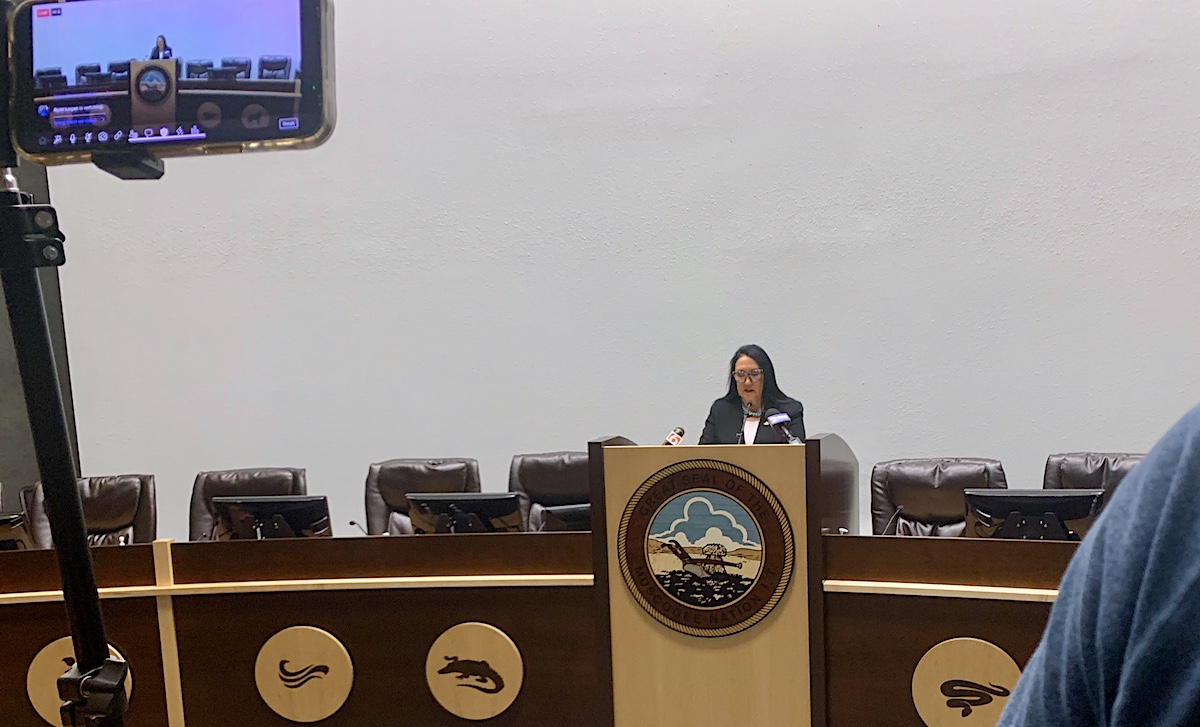OKMULGEE — The Muscogee Nation Attorney General’s Office has charged an Okmulgee County Jail officer for felony battery against a law enforcement official after an altercation with a Lighthorse deputy chief Monday where jailers initially refused to accept a detainee delivered by the tribal police department.
Filed Wednesday in Muscogee Nation Court, the “protected status battery” charge against Matthew Joseph Douglas appears to mark the tribe’s first time exercising new prosecutorial jurisdiction against non-Indigenous people who unlawfully apply force against a tribal law enforcement officer. Muscogee Nation Attorney General Geri Wisner said during a press conference Thursday that Douglas had not turned himself in by a 9 a.m. deadline and that her office was considering its next steps.
“We are having ongoing conversations with Attorney General (Gentner) Drummond and U.S. Attorney Chris Wilson and will be determining the best next steps,” Wisner said. “The assault of a Lighthorse police officer at the Okmulgee County Jail is the direct result of policies set by Okmulgee County officials that disregard state law.”
Embedded above, body camera footage released by the Muscogee (Creek) Nation shows two minutes of tense interactions between Lighthorse officers and detention officers at the Okmulgee County Jail. When Lighthorse officers delivered a man they had arrested for drug possession near a school, jail staff initially challenged the Muscogee agency’s authority to book a non-tribal citizen into the Okmulgee County Jail.
“He’s still in your custody,” jailer Matthew Douglas can be heard saying in the body camera footage of Lighthorse officer Aaron Torix. Douglas is the jail officer seen wearing a hat.
Lighthorse officer Keith Bell responds, “He’s not in my custody.”
As Douglas exits the pre-booking area of the jail, Lighthorse Deputy Chief Dennis Northcross catches the open door behind him and follows Douglas into the booking area. As other jail staff respond, Bell and Torix attempt to enter the locked door after seeing Northcross and Douglas in a physical altercation.
“Hey, you better take your hands off of him before you get that ass whipped,” Bell says.
As Okmulgee County Criminal Justice Authority director of law enforcement Tim Lawson enters the pre-booking area and opens the door to the booking area, a jailer and Bell have another brief physical altercation involving pushing and pointing.
“You’re going to fucking go with us, I promise,” Bell states to jailers afterward. “Your ass is going, too.”
As tensions escalate during the two-minute body camera video, the man detained by Lighthorse officers begins to speak.
“What is going on?” the man asks. “Oh my god, this is all because of me? I’m so sorry.”
‘That’s not an option’

Monday’s tense situation involved confusion over Muscogee Lighthorse officers’ cross-deputization agreement with the Grand River Dam Authority, an Oklahoma state agency that operates power plants and manages some bodies of water.
GRDA operates its own police department and, following the U.S. Supreme Court decision in McGirt v. Oklahoma, signed cross-deputization agreements with tribal police departments. Because Title 82, Section 862 of state statute grants GRDA full jurisdiction in counties where GRDA controls state assets, cross-deputized Muscogee Lighthorse officers also hold those powers.
In the body camera video, Lawson and Lighthorse officers can be heard disagreeing over whether the Muscogee Nation’s agreement with GRDA means the tribe can book detainees into the Okmulgee County Jail.
“We don’t recognize the GRDA jurisdiction,” Lawson says in the video.
Torix, the Lighthorse officer whose body camera footage was released, responds: “It’s the state of Oklahoma!”
Northcross also replies: “That’s not an option.”
Lawson responds to them.
“It’s my director saying they’re not,” he says.
Unlike many counties where sheriffs run the jail, the Okmulgee County Jail is governed by a separate county trust. Shannon Clark serves as executive director and chief of law enforcement for the Okmulgee County Criminal Justice Authority, but asked about Monday’s altercation in his jail, he said he could offer few details.
“I don’t know much about what’s going on myself, brother. You might need to call Lighthorse,” Clark said.
Clark had Lawson call NonDoc about the situation Wednesday night. Ultimately, according to Lawson, jail staff reviewed the Muscogee Nation’s contract with GRDA and learned that the the tribal department had authority on behalf of GRDA to book detainees at the Okmulgee County Jail.
“They had yet to try to bring an inmate in under that law enforcement commission until Monday. When they showed up Monday, they were adamant that they were GRDA commissioned. They tried to bring in an inmate. The guys on the floor are not certified officers. They’re detention officers, and they said, ‘You’re going to have to hold on until we find out for sure what ‘s going on because we’re under the impression that we can’t accept your prisoners like that.’ And they called. They got ahold of a captain. The captain had called me and said, ‘Lighthorse is down here and they’re trying to book one in.’ I said, ‘OK, I’ll go down and talk to them and see what we can come up with,'” Lawson said Wednesday night. “I go down and I see their deputy chief and one of our officers involved in what — from the position I was at — appeared to be somewhat of a physical confrontation. I’m not going to say by any means a full out fight, but more blocking of each other.”
Lawson, a Muscogee Nation citizen himself who has spent nearly 40 years working for a variety of law enforcement agencies, said jail staff are not supposed to let anyone into the booking area.
“Our Sgt. Douglas had went out and talked to them and was on his way back in, and their deputy chief — before the door had shut — came inside. When he turned around, that’s kind of when the physical confrontation started,” Lawson said. “I don’t know — I mean, he’s not supposed to be in there. That’s a given by any number of standards, rules and laws. That’s just a given. I don’t know what the goal was by coming inside. I don’t. It’s just a concrete room with a desk in it and computer. There’s no inmates, there’s no additional supervisors. There’s not a lot to it. (…) But he was adamant about not leaving that. His officers outside, apparently after when they’d seen what was going on, called for assistance.”
Lawson said community rumors about agencies pointing guns at one another during a “standoff” were untrue.
“It wasn’t a standoff. Somebody called for assistance. And we’d have probably done the same thing, or any law enforcement agency would — said, ‘Hey, supervisor needs help. There’s something going on.’ So all their officers showed up. It was by no means a standoff. Most of the guys who showed up on the outside of it had no idea what was going on in the inside,” Lawson said. “It was more of a misunderstanding. Within a matter of two or three minutes, we reviewed the statute where that was all found. Okmulgee is listed in it, we conceded, we took their prisoner, and everybody shook hands, and it was supposed to be a done deal. Today we find out that a warrant had possibly been issued for one of our employees as a result of that physical confrontation — and when I say that, again, it was more of chest bumping than swinging fists. It’s just sad. It’s a sad state of affairs.”
Lawson, who worked briefly for Muscogee Lighthorse after retiring from the Tulsa Police Department, said he worries that his tribe’s decision to charge Douglas could exacerbate existing tensions between tribal and non-tribal law enforcement agencies.
“I don’t know what the issue is with the other agencies, but there is some animosity between tribal and state law enforcement,” Lawson said. “Come January, I will be on my 39th year, and this is the biggest — oh, I don’t know how to explain it — It’s really a shame is what it really is. Law enforcement ought to be able to get along.”
Lawson noted that he supported the Lighthorse officers’ arrest of the man allegedly caught with fentanyl after driving the wrong way down a street near a school. Wisner also emphasized the importance of taking that drug off the street.
Neither Lawson nor a spokesperson for the Muscogee Nation provided copies of public records pertaining to the person’s arrest and booking prior to the publication of this article.
MCN attorney general wants Okmulgee County officials ‘held accountable’

During her press conference inside the Muscogee Nation Tribal Council chambers, Wisner said a separate clip of body camera footage includes someone on staff at the jail saying that they do not consider Lighthorse officers “real police.” That portion of the video had not been released publicly at the time of this article’s publication.
“The video clearly shows jail staff explaining that it is official jail policy as directed by the administrator and sheriff to violate state law and selectively refuse prisoners. So, in addition to the prosecution of Mr. Douglas, we are in discussion with the Oklahoma attorney general and the U.S. Attorney’s Office and the Department of Justice Civil Rights Division regarding the unlawful policies and disrespect from Okmulgee County officials both here at the jail and beyond,” Wisner read from prepared remarks. “We understand that the Okmulgee County officials dislike federal laws that grant tribal law enforcement jusrisdiction. But those political opinions do not give Okmulgee County the right to disregard and violate laws. It certainly does not give them license to assault another police officer.”
Wisner also referenced a separate dispute involving the Okmulgee County Jail. As outlined in a story by Clifton Adcock and Dylan Goforth of The Frontier, state agencies have sought an injunction prohibiting the jail from housing juvenile detainees in the same spaces as adults.
“This facility is already facing an ongoing investigation by the Oklahoma State Department of Health and the Office of Juvenile Affairs for the mistreatment of juveniles in their custody, including purposefully housing juveniles with adult inmates,” Wisner said. “We intend to ensure that Matthew Douglas is held accountable for his assault on Deputy Chief Northcross. But we also believe that top officials in Okmulgee County must be held accountable for the environment of lawlessness they are creating. None of these people are above the law.”
‘Protected status battery’ charge authorized by Congress in 2022
Tribal nations have not always had the authority to pursue the arrest and prosecution of a non-Indgienous person like Douglas, who is accused of assaulting the Lighthorse deputy chief.
The U.S. Supreme Court’s 1978 decision in Oliphant v. Suquamish Indian Tribe involved a non-native attending a tribal event assaulting a tribal police officer. The court held that “Indian tribal courts do not have inherent criminal jurisdiction to try and to punish non-Indians, and hence may not assume such jurisdiction unless specifically authorized to do so by Congress.”
Since Oliphant, Congress has authorized tribal nations to bring criminal cases involving domestic violence through the Violence Against Women Act. In 2021, Congress amended the statute to include the crime of assaulting tribal justice personnel, and the law took effect in 2022.
Lawson, a Muscogee citizen, said he did not know of the federal law change authorizing a tribe to file a “protected status battery” charge against non-Indians who unlawfully apply force against tribal law enforcement.
“It’s kind of an obscure aspect of that law. I wasn’t even aware that it existed, truthfully,” Lawson said. “I’m a certified law enforcement currently. I’m a full member of the tribe. Had we gotten into it, do we file charges on each other for protected status battery? If we’re both natives, it just seems like it gets so convoluted.”
Lawson said he has never understood why some non-tribal law enforcement agencies and some tribal law enforcement agencies have periods of bad blood.
“I never really got it. When I was at TPD, I was cross-depped. When I was with the tribe, I was cross-depped with TPD,” he said laughing. “At one point, I was on vacation there and I was cross-depped both ways. I understand it. I see it from both sides,” Lawson said. “I think going forward, it can all be resolved. But this isn’t the way to do it. Issuing a warrant for somebody who was just trying to maintain the integrity and security of the jail? I’m sure from the outside it looked like a big story and there’s probably a lot of people talking about it, but for the people that were involved in the inside, it wasn’t that horrendous of an event. It was more of a miscommunication, and once it was resolved we booked in their guy, and everybody left.”
Lawson said he has seen disputes between law enforcement agencies get out of control before.
“If I had a family member that’s driving a tribal tag, I don’t want them targeted just because law enforcement is aggravated with something that took place in another county,” Lawson said. “It happened several years ago. A trooper had written a municipal officer’s wife a ticket. That agency started tracking down troopers and writing their wives tickets. They finally had to just call a truce. It just got out of hand, and I don’t want that to happen. I’ve been doing this this long, and man I’ve loved my career, and I’d like for it to end with something positive out of it.”
To that end, Lawson referenced a recent gathering of Okmulgee-area law enforcement agencies and Oklahoma Attorney General Gentner Drummond.
“The whole objective was to develop those relationships. He sees a benefit in it. I see a benefit in it, having worked for both the tribe and state law enforcement. I don’t know that a lot of headway was made, but a lot of misnomers were corrected. There was a lot of stuff like that was sorted out,” Lawson said. “We have every intention, and still to this day — we don’t have a reason to be in competition with any law enforcement. We’re not on the street. It doesn’t impede or affect our performance.”
Nonetheless, striking cross-deputization agreements between Muscogee Lighthorse and local non-tribal agencies has sometimes proven difficult. For instance, the Muscogee Nation and Okmulgee Police Department have not been able to sign an agreement, and tensions have previously flared between Muscogee Lighthorse and Sheriff Marcia Maxwell in neighboring Hughes County.
Lawson said he would like to see agreements worked out among all parties to clarify situations and avoid animosity and confusion.
“I hope that the good that comes out of this is that there is a resolution, that it comes to an end, that it is addressed and there are finally some decisions made,” Lawson said. “There were several people that were pretty upset within the community, within the court system, within law enforcement and within the area in which we work. It’s going to carry over into other agencies.”
Late Thursday, Gov. Kevin Stitt released a statement and said he would be convening “stakeholders” for a discussion.
“This is the direct effect of the broken system created by the McGirt decision. Without jurisdictional clarity, we are left with a patchwork system and heightened tensions,” Stitt said. “I am glad cooler heads prevailed and prevented the situation from escalating to a dangerous level, but this demonstrates the need for collective action. In response, I am gathering stakeholders to discuss practical solutions that keep our citizens and law enforcement safe while I continue to call on Congress and the courts to address this problem.”
(Update: This article was updated at 6:25 p.m. Thursday, Dec. 12, to include comment from Stitt. It was updated again at 8:30 a.m. Thursday, Feb. 29, to correct spelling of Lighthorse Officer Aaron Torix’s name. NonDoc regrets the error.)





















